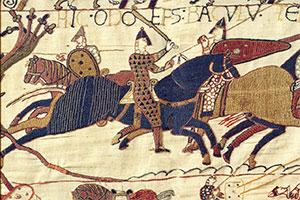A Quick Guide to a History of English: What Are Doublets?
English is thought to have the largest vocabulary of any language in the world. Many English words have meanings that can seem incredibly similar, or sometimes even the same.
For example, why do we have two words for ‘flat’ and ‘apartment’? How about ‘dish’ and ‘platter’? And why is a cow called a cow when it’s in the field, but ‘beef’ when it’s on my plate? All these words are what we call doublets - words that sound different, but have similar or related meanings and a shared history.

Why does English have so many? The answer is in the history of England and its various conquests.
In 1066, the Norman Duke William II, later to be known as William the Conqueror, led his armies to war against King Harold of England and defeated him at the battle of Hastings.
Within 20 years of his victory, William had replaced the elite classes of England with a French-speaking nobility. With the French speakers at the top of the social ladder, and the English speakers at the bottom, French quickly became established as a “prestige language” – a language associated with high social status.
Over time, English speakers began to add French words to their vocabularies in order to communicate with - and maybe to seem more similar to - their French occupiers. Gradually, the sounds of these French words changed over time and became some words we know today.

Not all doublets come from these origins however. The English language has influences from all over the world, from Italy to Germany to Scandinavia. Some doublets share only one root word, while others have two or more. Some even have their roots in words that were used hundreds of years apart.
Here are some interesting examples of doublet pairs, and some information about their different histories:
Cow vs. Beef
The word cow comes from the Old Norse word kúga, which meant ‘to oppress or intimidate’. Beef comes from the French word boef, which is related to the Latin bós, meaning cow.
Shadow vs. Shade
Both ‘shadow’ and ‘shade’ come from the Old English word scead, which became shadwe in Middle English.
Warden vs. Guardian
‘Warden’ comes from the old Norman word wardein which means ‘one who guards’. Interestingly, ‘Guardian’ is also French in origin, but originated in Modern French well after the Norman conquests. The ‘W’ → ‘G’ sound change is commonly seen in comparisons of Old and Modern French.
Skirt vs. Shirt
The word ‘skirt’ comes from the Old Norse word skyrta whereas ‘shirt’ can be traced to the Old English scyrte. Though in modern usage these two words have very different meanings, in the 14th century peasants commonly wore a single long shirt that would be used as all-in-one clothing, explaining the similarity between shirt and skirt.
If you want to know the history of any other English words that you think are very similar in meaning, let us know and we'll do the research for you.
